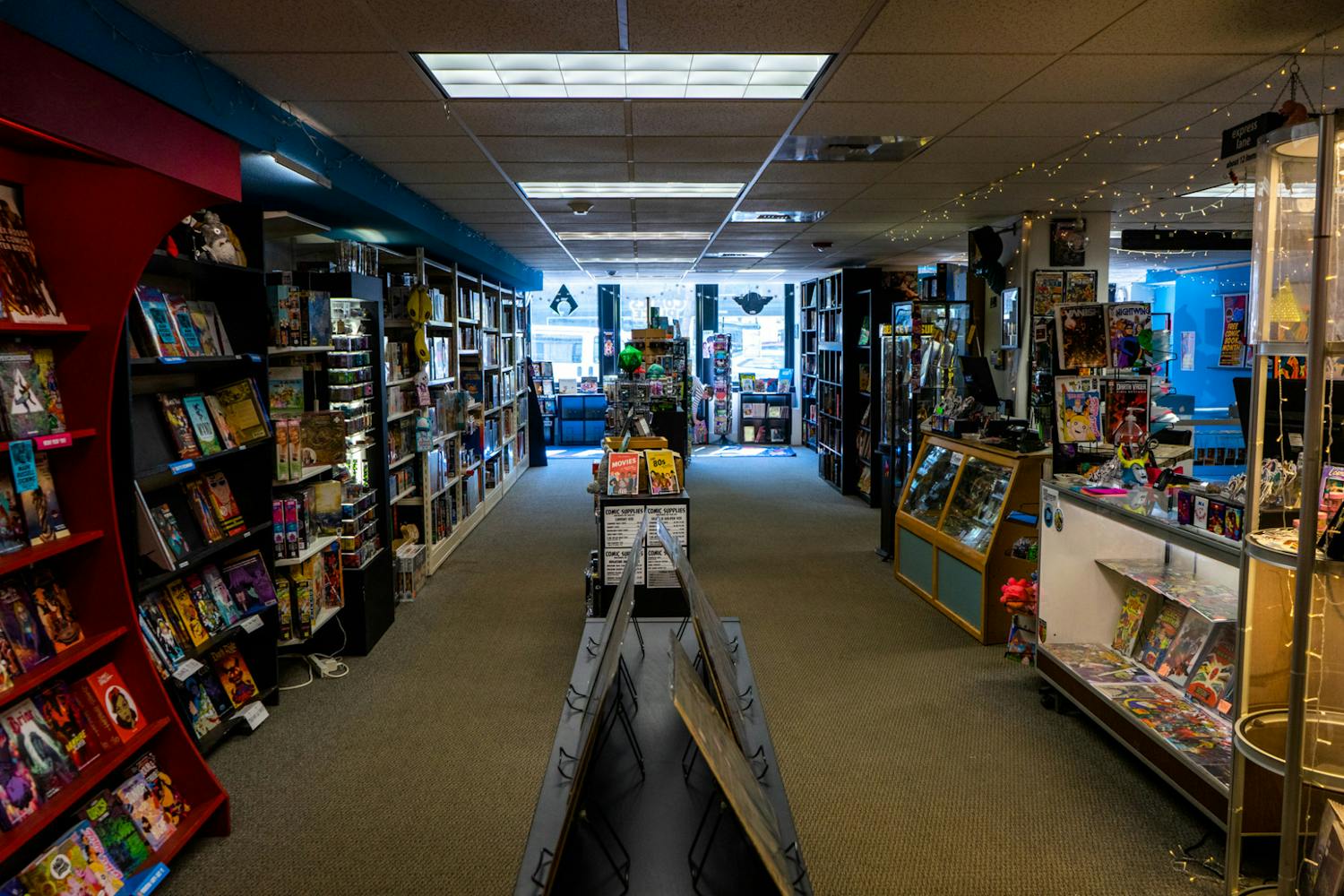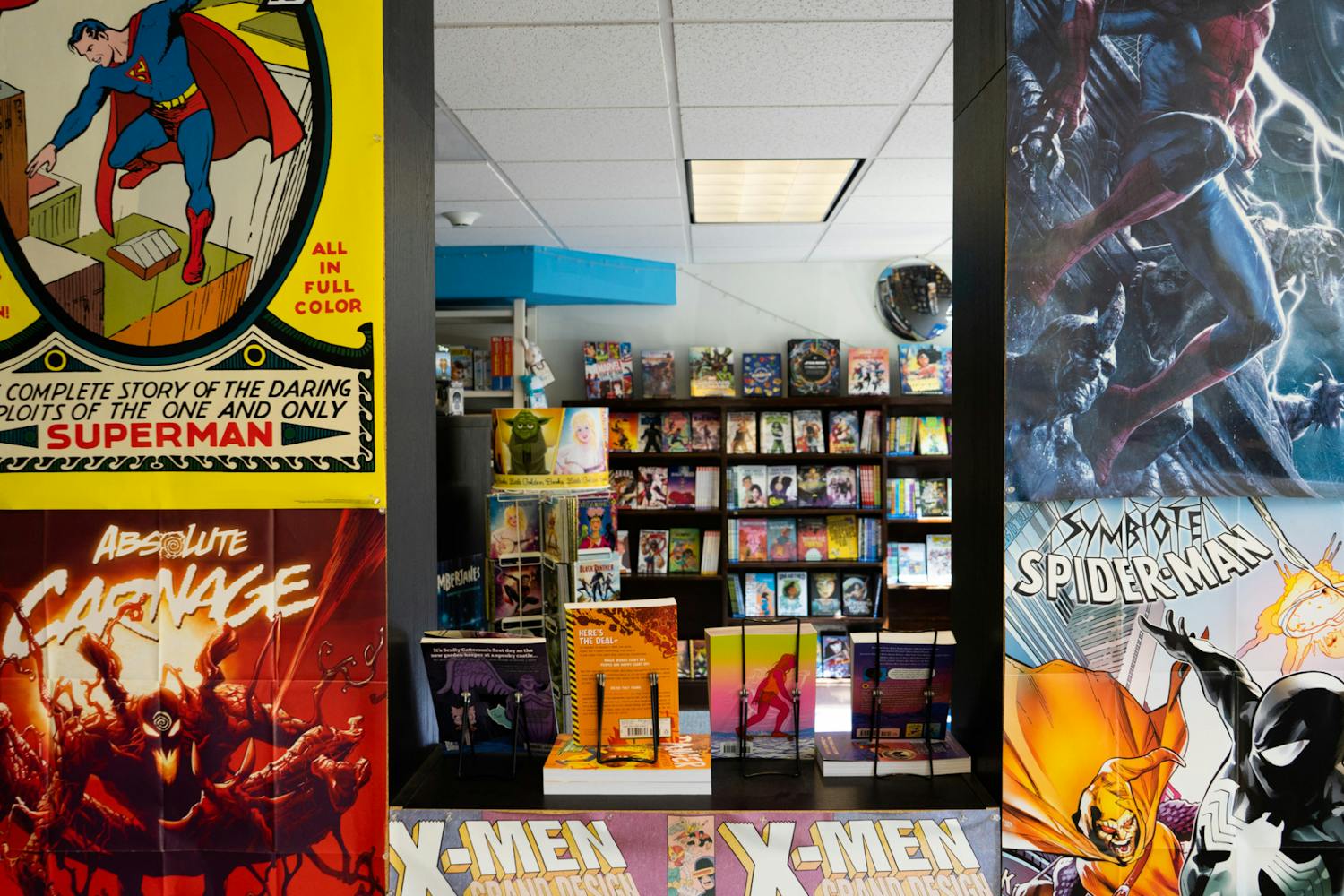The faded superhero panels pasted on window panes outside of The Comics Place disguise the flood of color that greets people when they enter the interior — comic books, figurines, board games and playing cards of all sorts line every inch of the space.
Located on Holly Street, The Comics Place opened in 1982 and is the second-ever comic book store in Bellingham. In 2016, Jeff Figley and Django Bohren became the fourth owners of the store, taking over after previous owner Art Delgadillo passed away.
“He was a wonderful giant of a man who just loved comics. Django and I want to carry on [the store’s] legacy of providing alternative art to folks who seek it out,” Figley said.
Comics trigger areas of our brain associated with language and areas that process images, making comics easy to engage with. This is called multimodal literacy, according to a research article by Dale Jacobs.
A big draw of comics is their “snackability,” said Keegan Lannon, a lecturer who specializes in comic books at the University of Illinois Chicago.
Now, the digital age has presented an alternative to the traditional magazine comics or “floppies” that comic book stores specialize in.
Both Marvel and DC Comics released their own monthly subscription service where readers can access every issue digitally.
While these online services provide easy access, some experts say that comics can never truly make the digital switch. In a convention, DC comic book writer Mark Waid argued the page layout is all-important due to the way our eyes move between panels and our devices cannot display that accurately.
“I like to have the art in my hand, so I can really appreciate the physical reading,” said Grayson Molyneux, a comic book collector and regular at The Comics Place.
There is a place for both digital and physical comics for readers. “It is definitely a big part of the industry, but not something that’s kicking our butt. I can’t stand reading stuff digitally,” said Colette Penketh, store manager of The Comics Place.
Comics have been around since the turn of the 20th century when publishers decided to combine weekly newspaper comics into a magazine format, Lannon said.
The medium exploded in popularity with as many female readers as males at the time. Moreover, it was progressive; one issue, for example, showed Captain America punching Hitler nearly a year before the U.S. entered WWII.
But during an age of censorship in the 1950s, audiences were largely reduced to young boys who enjoyed reading superhero stories, a readership that aged into long-time collectors.
"Successful stores have shifted focus from collectors to new readers," Lannon said. "They have become more like community outreach centers.”
The Comics Place is one such establishment that has made the transition. In the store, there are zones meant to appeal to new readers and other sections, such as new releases for collectors.
“We truly believe there is a comic for everybody and we want to help,” Penketh said.
Comics have since rebounded from a dark age of censorship and are back in the mainstream.
Pieces like Art Spielgman’s “Maus,” which won a Pulitzer Prize, Raina Telgemeier's “Smile” and Marjane Satrapi’s “Persepolis” have made their way into English curriculums and the hands of many Americans.
Despite the supposed threat from digital formats, The Comics Place is still welcoming new readers every day — young and old, male, female and nonbinary.
“We try to be as inviting and welcoming of space as possible to absolutely everyone who walks through the door,” Penketh said.
They are always ready to recommend comics.
Staff are dedicated to catering to their customer’s needs, going as far as to search the attic for specific issues, Molyneux says.
The staff has read their fair share of comics, especially co-owner Jeff Figley, who used to make two-hour trips as a kid to the nearest comic book store with his dad – who was an even bigger fan.
“Since I was a kid I've always just asked myself ‘What would Superman do?’ I personally have gotten through the toughest times in my life with comics. I want to make sure I give other people the same opportunity,” Figley said.
Eli Voorhies (he/him) is the opinions editor this quarter. Previously, he was a city life reporter and editor. In his free time, he climbs, photographs and spends more time messing around than working at Legendary Vinyl Records. You can reach him at eliv.thefront@gmail.com.









